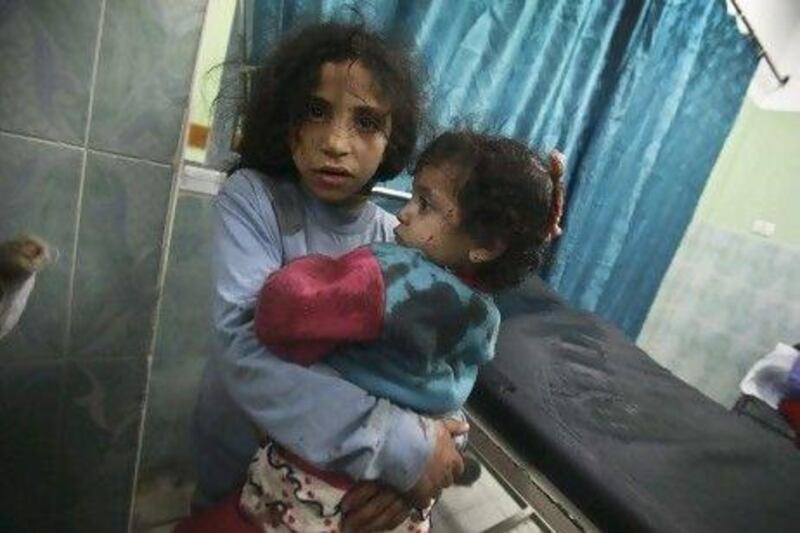JERUSALEM // Israel and fighters in the Gaza Strip traded fire for a fourth day despite international efforts to halt escalating fighting that has killed at least 21 Palestinians and injured many more.
The Israeli military carried out at least six air strikes on Gaza yesterday, reportedly killing two Islamic Jihad fighters in separate attacks. A 16-year-old boy also was killed and half a dozen bystanders injured in another air strike.
Israel's military said the attacks were retaliation for sustained rocket salvos from Gaza that forced schools to shut throughout much of the country's south for two days.
One Gaza-fired projectile landed just 40 kilometres south of Tel Aviv. Another struck the port city of Ashdod. Thirty-seven rockets hit Israel yesterday and as many as 200 had been fired at it since the fighting started after Israel assassinated the leader of the Gaza-based Popular Resistance Committees (PRC) militant group on Friday.
An Israeli military spokesperson, Brigadier General Yoav Mordechai, confirmed Israeli officials were in contact with Egypt over a truce.
Several officials from Hamas, the Palestinian movement that controls Gaza, also have expressed their desire to agree to an Egyptian-brokered ceasefire.
Hamas's prime minister in Gaza, Ismail Haniyeh, said on Sunday Egyptian leaders were "working around the clock to stop the aggression".
Even though neither Hamas nor Israel appears ready for full-scale war, truce-mediation efforts have failed as Israel exchanges barrages of missiles, rockets and mortars with militant groups not aligned with Hamas, primarily the PRC and Islamic Jihad.
Hamas has not claimed responsibility for any attacks. But Israeli leaders hold it responsible for all weapons fired from Gaza.
Islamic Jihad, meanwhile, has vowed to fight on until Israel relents.
"The Zionist state began this aggression. It has to stop its aggression first and then we will evaluate the situation and study the possibility of calm," the Iranian-funded group's deputy secretary-general, Ziad Nakhleh, was quoted as saying on Islamic Jihad's website.
In previous flare-ups with Israel, analysts said Hamas permitted fighters from other militant groups to launch projectiles over the border - to "blow off steam", as observers put it - before decisively reining them in shortly after.
Hamas appears not to have stepped in this time.
Some see this as a decision by its leadership in Gaza to gain leverage over the group's foreign-based officials, especially the outgoing leader, Khaled Meshaal.
Hamas's leadership appears increasingly divided over Mr Meshaal's proposed reforms to the group, which include tentatively abandoning violent resistance and implicitly recognising Israel's right to exist.
That has irked rivals inside Gaza, who are also critical of what they consider as Mr Meshaal's unilateral decision-making style.
"They [Hamas's Gaza leadership] don't have an incentive to clash with other groups [firing rockets at Israel] at a time when the outside leadership is not giving them as much power and inclusion over decision making as they'd like to have," said Daoud Kuttab, an independent Palestinian analyst who lives in both Jerusalem and Amman. He spoke by telephone from the Jordanian capital.
"They are saying: 'You want to make decisions in Doha without our say? Well, look, we're capable of making our own decisions," Mr Kuttab added, referring to a reconciliation agreement Mr Meshaal brokered with the head of the rival Fatah faction and the Palestinian Authority president, Mahmoud Abbas, in the Qatari capital last month.
The agreement was harshly criticised by Hamas officials in Gaza.
Yaron Ezrahi, professor of political science at the Hebrew University of Jerusalem, said that this had given Tehran an opportunity to distract Israel by using the militant groups it backed in Gaza, particularly Islamic Jihad.
Hamas's ties with Iran have soured because of Hamas's strained relations with the Syrian government, a firm ally of Iran and former host to the Islamist group's headquarters.
"Islamic Jihad sees itself much more as an arm of Iran and, consequently, it is being used to test Israel, to see to what extent the Israeli government can be distracted from attacking Iranian nuclear sites," he said.
* With additional reporting by the Associated Press





